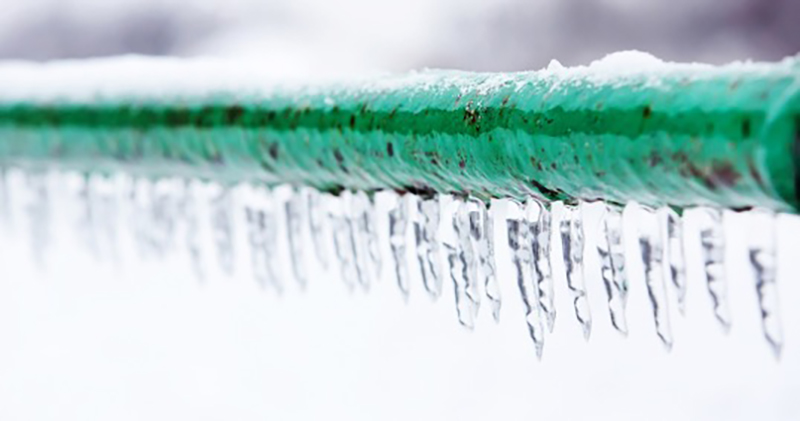Frozen pipes in mobile homes seem to occur more frequently than they reasonably should. It’s even worse during winter. Since the plumbing in a mobile home is located under the structure—where it is coldest and dampest—mobile homeowners should expect frozen pipes frequently, unless they choose to prevent it. In this guide, we’ll show you how you can spot frozen pipes, fix them, and prevent them from happening again. Good thing those pipes are easy to access in a mobile home; you’ll be able to do these yourself easily.
How to Notice Frozen Pipes in Your Mobile Home
Frankly, they are not at all subtle. You don't have to be professional to diagnose your plumbing, thaw, or replace them. All you need is the knowledge to interpret the symptoms and know when your pipes are in trouble.
If it’s freezing outside and water isn’t flowing out of your faucets, that’s a sign. An easy way to narrow this down to the faulty part of your plumbing is to try turning on all the faucets in your mobile home, including showers, to see which ones still flow.
If none of them is flowing, then your main pipeline is probably the problem: it's frozen, or it’s something else that’ll require the expertise of a plumber.
If you find that the faucet in the kitchen works but your shower doesn't, you could deduce that the shower plumbing is frozen. Now, you have to step outside and confirm it.
Some ways to confirm the pipes are frozen include
- Ice below some pipes: This is a sign that the pipes have a leak that has frozen over. The leak might be due to a previous time the pipes were frozen and the ice expanded until they cracked.
If it isn't severe and you are confident in your ability to fix the pipes yourself, turn off your water at the main supply before doing so.
- Icy spots on your pipes when you run your hands over them. Leave your faucets on while running your bare hands over the pipes. Feel for slight vibrations while water flows through the pipes. When a spot doesn’t vibrate like the rest and also feels icy-cold, then you know that spot is frozen.
- Sounds of solids inside the pipes when you tap them with a screwdriver or wrench. When objects are hollow, they have a unique sound they produce when hit by another object. Frozen pipes won't produce that sound; they won’t sound hollow.
Tap along the length of the pipes. Any spot with a different, rocky sound that’s also colder than others? That’s a frozen spot.
What to Do If the Pipes at Your Mobile Home Are Frozen

You have two primary choices. You can either
- Call a plumber to fix it up for you. This comes with the assurance of professional work. Plus, you don't have to go out in the uncomfortable cold to fix your plumbing yourself. Or…
- Do it yourself. You might make a mistake and break something your first time, no problem with that. You'll learn and the next time you have this problem and try again, you'll make sure not to make that mistake. The feeling of accomplishment when you're successful will not fade in a hurry.
How to Unfreeze Your Mobile Home’s Pipes
If you're sure you want to do this by yourself, there are techniques you should use to reduce the risk of further damage to your plumbing and home:
1. Use a heat tape
This is probably the best option and is a fix-and-prevention method in one due to its design (especially the modern ones). Wrap the tape around the pipe as much as you want, and plug the other end into a power outlet. Leave it for a while to thaw the ice.
Ensure that when you're wrapping the heat tape around the pipe, it does not overlap. It becomes a fire hazard then.
2. Use a heat gun or hair dryer
The heat gun is a good appliance to use in thawing frozen pipes. Just set it to between 110°F and 145°F, point it at the spot of frozen piping, and move it back and forth. Take care not to apply too much heat. It’ll warp the pipe.
You can also try a hair dryer, but it is a less powerful appliance than the heat gun, so you will spend longer down there. Ensure you follow the same procedure in applying the heat.
Leave your faucet open (just a little) while you do this so the resultant steam and melted ice have a place to go. Doing this also makes sure ice doesn't just migrate to another spot and obstruct flow when you're done.
A space heater could also warm up the area around the frozen pipes enough over time to thaw them out. Be prepared to quickly turn off the water main line. If there is a crack, the water will come shooting out and it will be very difficult to stop.
3. Hot towels can work
Get a bucket of hot water, soak a towel in it, and wrap it around the affected spot. This method requires a ton of patience. You have to change the towel every 7 minutes for quick thawing.
What to Avoid When Unfreezing the Mobile Home Pipes
PVC pipes are the most common type of pipes in use for domestic purposes. When thawing them, it's advisable not to use heat beyond 160°F. This means an open flame should never be used, as it can cause your pipes to melt.
Do not use:
- A kerosene heater
- Propane lamp
- A blow torch
Or any other flame-producing devices and appliances.
You should also not try to thaw your pipes by knocking at them with a hammer. There's no telling how brittle the ice has made the pipe. Hitting it with a hammer has a high chance of breaking it like a dry stick.
Refrain from trying to thaw out the pipes by pouring hot or boiling water down the drain. That will only melt your pipes and cause a horrible leakage in an unlucky place or, best case, warp them into a bottleneck.
How to Prevent Frozen Pipes in Your Mobile Home
You can save yourself all that effort by taking steps to reduce the chances of your mobile home plumbing freezing.
Here are a few things you can do to make sure you always have water:
- Wrap heating tape around your plumbing. Remember, heating tape is both a fix and a prevention method. Modern heating tapes have thermostats.
This means you can roll them out at the start of winter, inspect them to ensure they're in good working order, wrap them around your plumbing, set the thermostat to 70°F or 75°F, and you're set.
- Let water drip from the taps during the freezing days of winter. The constant movement of water in the pipes will make it harder to freeze.
- Repair any gaps in the skirting of your home. It leaves little chance for the cold to seep in and cause problems.
- Use pipe insulation like mineral wool or glass fiber. This will protect your pipes from direct assault by the cold.
- Keep your home heated at all times. This will help other anti-pipe-freeze measures you use to combat the cold.
We literally can't live without water; there is a reason water is a necessity in life. Anything that can threaten the availability of such an important resource should be dealt with early or prevented, if possible.
Whether you choose to have a professional unfreeze your mobile home pipes for you or you decide to do it yourself, the important thing is to ensure that you handle it earlier than later. As the frozen pipes can expand and break.
If you find you can't keep up with the maintenance of your mobile home and it’s not a top priority to hold on to it right now, consider donating it to a charity.
Banyan Mobile Home Removal is an affordable housing non-profit that will make sure your donation gets to the right person and makes a difference in their life. We can help remove your mobile home for free.
Your mobile home doesn't have to be falling apart before you consider giving it away. You can reach us today and donate a mobile home.


